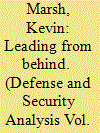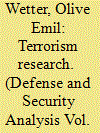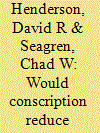| Srl | Item |
| 1 |
ID:
131362


|
|
|
|
|
| Publication |
2014.
|
| Summary/Abstract |
In March 2011, President Barack Obama ordered US air and naval forces to commence Operation Odyssey Dawn in Libya to impose a no-fly zone. The decision by the Obama Administration to intervene in a limited and supporting role in Libya is an important development in US foreign policy. Operation Odyssey Dawn presents scholars with a valuable opportunity to analyze and explore how US foreign policy is made and what roles domestic politics and elite perceptions play in decisions to use force. The author argues that neoclassical realism is a useful and compelling theoretic framework with which to analyze Operation Odyssey Dawn. While the Administration intervened in response to perceived external-level threats to US national interests, salient intervening domestic-level variables and elite perceptions shaped and guided the tenor and scope of the operation.
|
|
|
|
|
|
|
|
|
|
|
|
|
|
|
|
| 2 |
ID:
131364


|
|
|
|
|
| Publication |
2014.
|
| Summary/Abstract |
Defence offsets are elements of defence procurement deals additional to the primary content. Offsets are usually expected to yield technological or industrial benefits to the purchasing country (e.g. countertrade, technology transfers, or additional jobs) and military buyers often require suppliers to make offsets available "cost-free." The authors argued previously that such strategies achieve little of value to buyers that lack market power and are unnecessary otherwise, since purchasers with the market power to extract more value for money from foreign suppliers can do so anyway. This article also focuses on the supply side of offset deals. The USA is the world's largest defence offsets supplier but the US government opposes offsets demands as economically inefficient and trade distorting. Even if offsets are inefficient and trade distorting, they may still benefit a materiel-exporting country such as the USA as they may induce exports and create associated benefits for the offsets provider.
|
|
|
|
|
|
|
|
|
|
|
|
|
|
|
|
| 3 |
ID:
131360


|
|
|
|
|
| Publication |
2014.
|
| Summary/Abstract |
The evaluation and selection of military strategy requires consideration of myriad factors - social, historical, political, geographical and technological - together with vast uncertainties encompassing all these domains. Info-gap decision theory is a conceptual framework that can support these deliberations and that has substantive implications for the formulation, evaluation and selection of strategic goals and of the means to attain them. In particular, while the analyst may desire to reliably achieve the best possible outcome, info-gap theory provides a critique of, and alternative to, the paradigm of optimizing the outcome of a decision. In selecting between strategy alternatives, the analyst must sometimes choose between one alternative that is purportedly better than another, but also more uncertain. Such a choice is a dilemma whose resolution requires the analyst to balance between the different predicted qualities of each alternative and their different vulnerabilities to uncertainty. The dilemma can be managed with the info-gap methodology of robustly satisfying critical requirements.
|
|
|
|
|
|
|
|
|
|
|
|
|
|
|
|
| 4 |
ID:
131359


|
|
|
|
|
| Publication |
2014.
|
| Summary/Abstract |
In terrorism research, three different sources of information and data exist: the terrorists and their environment; the incidents; and the population. This article discusses the strengths and weaknesses of research that is concerned with, or relies on, any of the mentioned sources. An in-depth understanding of the methodological issues that come with these sources is important to correctly interpret results from scientific studies. It is highlighted how the different scientific approaches add to a holistic view of terrorism as a phenomenon. Furthermore, the double-edged sword of information in the field of terrorism is discussed. From these deliberations, guidance concerning the future work of both scholars and decision-makers can be deducted.
|
|
|
|
|
|
|
|
|
|
|
|
|
|
|
|
| 5 |
ID:
131366


|
|
|
|
|
| Publication |
2014.
|
| Summary/Abstract |
As the USA continues to decline both in relative and absolute terms, the global order emerges where no center of power exists. This creates a complicated and instable geopolitical situation where small states could act behind the back of the great powers. The relationship between Turkmenistan and Ukraine is the example of this sort of relationship. Whereas Ukraine wants to get cheap gas, Turkmenistan wants to find the way to sell its gas to the West. It looks as though both countries pay little attention to Russian objection and act without direct help from either the USA or other great powers.
|
|
|
|
|
|
|
|
|
|
|
|
|
|
|
|
| 6 |
ID:
131363


|
|
|
|
|
| Publication |
2014.
|
| Summary/Abstract |
An increasingly popular justification for conscription is that it would increase the probability that the "children" of politically powerful people would serve in the military, thus giving them an incentive to lobby against war. However, this argument neglects the fact that avoiding war for a nation is a public good and is, therefore, subject to the classic free-rider problem. Under-provision of anti-war agitation from those seeking to avoid the draft is exacerbated by the fact that seeking a deferment provides an alternative with a superior private payoff. Empirical findings since World War II are consistent with our thesis.
|
|
|
|
|
|
|
|
|
|
|
|
|
|
|
|